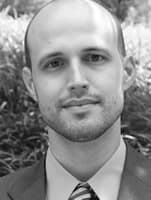Doctoral student in organizational science receives national award

David Askay, a Ph.D. student in organizational science, has received one of the most prestigious national research awards presented to students doing communication studies research.
The National Communication Association (NCA) presents the Donald P. Cushman Memorial Award for the top-ranked student-authored paper from all NCA units that competitively rank papers for programming at the NCA annual convention.
Askay will officially receive the award during the 98th annual convention in Orlando Nov. 15-18. He also will present his paper “Silence in the Crowd: The Spiral of Silence Contributing to the Positive Bias of Opinions in an Online Review System.”
“This is a major national honor that recognizes excellence in research, and David is truly deserving of this recognition of his scholarship,” said Steven Rogelberg, director of organizational science at UNC Charlotte. “His research holds great contemporary relevance, advancing both science and practice in an emergent area in the organizational sciences, social media.”
The College of Liberal Arts & Sciences and the Belk College of Business jointly support the interdisciplinary organizational science program, which focuses on employee and organizational health, well-being and effectiveness.
Askay’s research investigates positive bias of opinions in an online review system through the framework of the spiral of silence theory. He reviewed discussion forums in an online community of reviewers and determined that a fear of retaliation and isolation from the community reduces the willingness of members to voice minority neutral and negative reviews.
He also found that certain aspects of the user interface selectively constrained the ability of members to voice neutral and negative opinions, further marginalizing minority opinions and contributing to the positive bias in the system.
“I looked at a travelers’ website where people can create a profile online,” Askay said. The community members use the site free-of-charge and stay in other members’ homes when they travel. They provide on-line reviews of their experiences.
“In the spiral of silence, people will refrain from saying opinions that differ from the majority opinion,” he said.
His review of open discussion groups, in which people talked about this practice, showed they gained benefits from being members, and they were concerned about making negative reviews for fear of retaliation through negative reviews from their guests. They also were confused about the terminology used, and the site limited comments’ lengths.
“When it came to negative and neutral reviews, people wanted to put more in there, to explain what they meant, but they hit a limit,” Askay said. “The material features, the design of the site, had an impact. It acted as an organizing factor, whether that was intentional or unintentional.”
Potential areas of study include privacy implications, the way in which design can mobilize collective action and whether some people’s opinions are more privileged or enabled, such as for people with better writing skills, Askay said.
“Whose opinions are excluded?” Askay said is one important consideration. Another aspect to consider is whether some people’s views are amplifying each other’s, rather than representing diverse viewpoints, he said.
While on-line communities are described as providing an opportunity to gain the views of larger groups or crowds, certain users may have more influence, such as when on-line sites invite select reviewers to events that solidify them as an influential sub-group within the larger group. Askay may explore these and other questions in his continuing research.
The National Communication Association advances communication as the discipline that studies all forms, modes, media and consequences of communication through humanistic, social scientific and aesthetic inquiry. The NCA serves the scholars, teachers, and practitioners who are its members by enabling and supporting their professional interests in research and teaching.
It was founded in 1914 as the National Association of Academic Teachers of Public Speaking and has evolved through the leadership of many visionary individuals. Today, the association boasts a membership of more than 8,000 educators, practitioners, and students in every state and more than 20 countries.